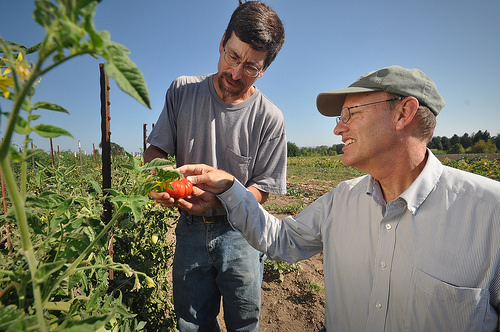Since USDA’s Agricultural Marketing Service (AMS) (
http://www.ams.usda.gov/ ) implemented the organic regulations (
https://www.ams.usda.gov/rules-regulations/organic ) in 2002, the U.S. organic sector has tripled in size to over 22,000 certified organic operations (
http://apps.ams.usda.gov/integrity/) with over $43 billion in U.S. retail sales. Demand for organic products is expected to continue growing. This strong consumer demand outruns supply, providing market opportunities within the organic sector.
USDA offers many resources for organic producers and businesses – including organic certification cost share assistance, organic price reporting, conservation programs, and so much more – to facilitate growth within the organic sector. We also provide assistance to producers (
http://blogs.usda.gov/2016/04/21/transitioning-to-organic-certification/ transitioning to organic production ), and work to facilitate international trade.
To learn more about our services, you can now visit the redesigned USDA organic portal (
http://www.usda.gov/organic ). The new site features a more user-friendly design with updated content that allows you to access the USDA resources for the organic community from one centralized location.
During this Administration, we strengthened the USDA Organic Working Group – an internal information-sharing group who come together to coordinate USDA programs and services that support the organic sector – and successfully worked across agencies to expand our organic services. Additionally, Secretary Vilsack issued guidance (
http://www.usda.gov/documents/usda-departmental-guidance-organic-agricul... )(PDF, 95.6 KB) to all USDA agencies affirming the department-wide commitment to the organic sector. Our collaborative efforts have set the groundwork for continued growth by connecting farmers and businesses to training, strengthening the National Organic Program, funding organic research, and improving crop insurance options for organic producers. Here are just a few examples.
Our Sound & Sensible initiative (
https://www.ams.usda.gov/reports/sound-sensible )is simplifying and streamlining the organic certification process, and providing tools and resources to the entire organic community. The Risk Management Agency (RMA) (
http://www.rma.usda.gov/news/currentissues/organics/) provides improved insurance options for organic producers, including organic premium price elections for 57 crops, and a transitional crop insurance option, offering insurance that better reflects the product's market value.
Since 2009, the Natural Resource Conservation Service (NRCS) has worked with more than 6,800 organic farms and provided more than (
https://www.fsa.usda.gov/news-room/news-releases/2016/nr_20160226_rel_0020) Earlier this month, the National Agricultural Statistics Service (NASS) published results from its fourth organic producer survey, (
https://www.nass.usda.gov/Surveys/Guide_to_NASS_Surveys/Organic_Producti... ) showing a significant increase in organic farm receipts and reflecting updated data on prices, farming practices, and conservation practices.
Demand for organic products is not limited to the U.S. domestic market. The global organic market includes over 31,000 certified operations and is valued at nearly $80 billion annually. Organic trade continues to expand to meet the demands of the organic market. AMS works closely with countries around the world to support this growing market. We maintain organic equivalency arrangements (
https://www.ams.usda.gov/rules-regulations/organic/trade ) with Canada, Japan, Korea, Switzerland and the European Union. These arrangements simplify the process for all farms and businesses to participate in the global organic market to ensure the integrity of imported organic products.
We are committed to establishing a level playing field that protects all organic farms and businesses through clear and transparent standards while maintaining the integrity of the USDA organic seal for consumers. Earlier this year, we published a proposed rule clarifying requirements for livestock and poultry living conditions and health care practices. We are working on a final rule based off feedback from the organic community.
Organic continues to be a bright spot in the agricultural economy, and USDA strongly supports organic agriculture. We look forward to working together with the organic community.
Source:www.usda.gov/


